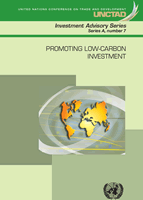
Building a low-carbon economy is a long-term proposition in which FDI can play an important role. Governments that have recognized this role should embark on policies that accommodate such investments and create the right business opportunities.
IPAs are a critical instrument in this journey, especially in the creation of the necessary partnerships to advocate the right policies, enhance the investment offer, improve a location’s image, target low-carbon investors and provide the aftercare services that will develop a lowcarbon business community.
What is highlighted in this guide is that partnerships and networks have proven critical in many low-carbon investment promotion strategies.
Examples of such partnerships are given in case studies from Brazil, China and Denmark. In the case of Pernambuco, Brazil, the partnering strategy started with cooperation between several State and federal institutions in an attempt to enhance local economic development.
In Hong Kong, China, partnerships between city departments and authorities in mainland China led to the creation of an innovation cluster initiative and in Copenhagen, partnerships between Government, industry and the academic world were the building blocks in the promotion and development of a clean technology cluster.
Key messages on the promotion of low-carbon investment
-
Globally, low-carbon FDI is substantial and occurs in the introduction of low-carbon processes in TNCs, the generation of clean energy and the production of low-carbon products and services.
-
FDI plays a key role in building low-carbon economies by bringing in capital and green technology as well as management, organizational and marketing skills.
-
Economic factors are important in attracting low carbon investments, but a strategy that includes implementation of a policy framework with a low-carbon perspective, market-creation policies, measures to promote technology transfer and a targeted investment promotion programme considerably enhances a location's offer.
-
Low-carbon target sectors should be carefully selected based on a government's greenhouse gas (GHG) mitigation and development objectives and solid research of a location's factor advantages compared to key competitors.
-
Given the importance of special policy tools, including incentives, for the low-carbon sector, IPAs should pay special attention to their role as policy advocates and investment facilitators to help create the right opportunities for FDI in the sector and awareness among investors of the location's green offer.
-
Due to the important role of partnerships and clusters in the development of a low-carbon business community, IPAs should dedicate considerable resources to aftercare services for the creation of business networks and linkages.



